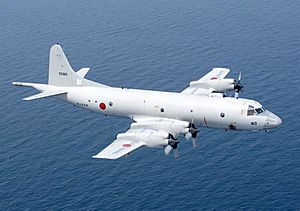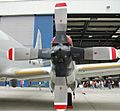Lockheed P-3 Orion facts for kids
class="infobox " style="float: right; clear: right; width: 315px; border-spacing: 2px; text-align: left; font-size: 90%;" ! colspan="2" style="text-align: center; font-size: large; padding-bottom: 0.3em;" | P-3 Orion |-
|- | colspan="2" style="text-align: center;" |  |- |colspan="2" style="border-bottom: 1px solid #aaa;text-align:center;" |A Japanese P-3C of the JMSDF |-
|- |colspan="2" style="border-bottom: 1px solid #aaa;text-align:center;" |A Japanese P-3C of the JMSDF |-
! Role | Maritime patrol aircraft |- ! National origin | United States |- ! Manufacturer | Lockheed
Lockheed Martin
Kawasaki Heavy Industries |-
! First flight | November 1959 |-
! Introduction | August 1962 |-
! Status | Active |- ! Primary users | United States Navy
Royal New Zealand Air Force
Japan Maritime Self-Defense Force
Royal Australian Air Force
Republic of Korea Navy |- ! Produced | 1961–1990 |- ! Number built | Lockheed – 650,
Kawasaki – 107,
Total – 757 |-
! Unit cost | US$36 million (FY1987) |- ! Developed from | Lockheed L-188 Electra |- ! Variants | Lockheed AP-3C Orion
Lockheed CP-140 Aurora
Lockheed EP-3
Lockheed WP-3D Orion |- ! Developed into | Lockheed P-7 |- |} The Lockheed P-3 Orion is a powerful airplane built by Lockheed. It has four engines and is used by many countries around the world. Its main job is to be a Maritime patrol aircraft, which means it flies over oceans to watch for ships and submarines.
The P-3 Orion has a special long tail at the back. This tail holds important equipment that helps it find things underwater. The plane is powered by strong Rolls Royce Allison T56-A-14 engines, which use large Hamilton Standard propellers to push it through the air.
Contents
What is the P-3 Orion?
The P-3 Orion is a type of aircraft known as a maritime patrol aircraft. This means it's designed to fly long missions over the sea. Its main tasks include:
- Finding and tracking submarines.
- Watching for enemy ships.
- Helping with search and rescue missions.
- Gathering information about what's happening in the ocean.
It can fly for many hours and cover huge areas of water.
How the P-3 Orion was Developed
The P-3 Orion was first designed in the 1950s. It was based on a passenger airplane called the Lockheed L-188 Electra. The first P-3 Orion flew in November 1959. It was officially introduced for use in August 1962.
Over the years, many different versions of the P-3 Orion have been made. These include the P-3K, P-3C, and P-3A models. Each version has been updated with new technology.
Who Uses the P-3 Orion?
The P-3 Orion is a very popular aircraft. The United States Navy is its main user. However, many other countries also use it. These include:
- The Royal New Zealand Air Force
- The Japan Maritime Self-Defense Force
- The Royal Australian Air Force
- The Republic of Korea Navy
In total, over 750 P-3 Orion aircraft have been built. Lockheed built about 650 of them, and Kawasaki Heavy Industries in Japan built 107.
Special Features of the P-3 Orion
The P-3 Orion has several unique features that help it do its job.
Magnetic Anomaly Detector (MAD)
One of the most important tools on the P-3 Orion is its MAD boom. This is the long stick-like part at the very back of the plane. It helps the aircraft find submarines hidden underwater. It works by detecting small changes in the Earth's magnetic field caused by large metal objects like submarines.
Sonobuoys for Underwater Listening
The P-3 Orion can drop special devices called sonobuoys into the ocean. These are small buoys that float on the surface or sink underwater. They have microphones that listen for sounds from submarines or other underwater objects. The P-3 Orion then receives these sounds, helping its crew locate what's below.
Powerful Engines and Propellers
The P-3 Orion uses four powerful turboprop engines. These engines are known for being reliable and efficient, allowing the plane to fly for long periods. Each engine has a large propeller with four blades, which helps the aircraft take off and fly smoothly.
P-3 Orion in Action
The P-3 Orion has been used in many important missions around the world.
Surveillance and Patrol Missions
Its main role is to patrol large areas of ocean. It helps countries keep their waters safe and secure. It can track suspicious vessels or monitor important shipping lanes.
Search and Rescue Operations
Because it can fly for a long time and cover vast distances, the P-3 Orion is also very useful in search and rescue missions. It can help locate lost ships or people in distress at sea. For example, a P-3C Orion helped monitor the Maersk Alabama hijacking in 2009.
Fighting Wildfires
Some older P-3 Orion aircraft have been changed to fight wildfires. These planes are called "airtankers." They can carry large amounts of water or fire retardant and drop it on fires from the sky.
Images for kids
-
P-3 Orions from Japan, Canada, Australia, Republic of Korea, and the United States at MCAS Kaneohe Bay during RIMPAC 2010
-
A U.S. Navy F-14A Tomcat belonging to VF-213 escorts an Iranian P-3F Orion over the Indian Ocean – 1981
-
A Pakistan Navy P-3C Orion in Quetta, in October 2010
-
Aero Union P-3A Orion taking off from Fox Field, Lancaster, California, to fight the North Fire
-
P-3 aircraft of the Royal New Zealand Air Force, Royal Australian Air Force, and the United States Navy (with RAAF Dassault Mirage III)
See also
 In Spanish: Lockheed P-3 Orion para niños
In Spanish: Lockheed P-3 Orion para niños
 | May Edward Chinn |
 | Rebecca Cole |
 | Alexa Canady |
 | Dorothy Lavinia Brown |























